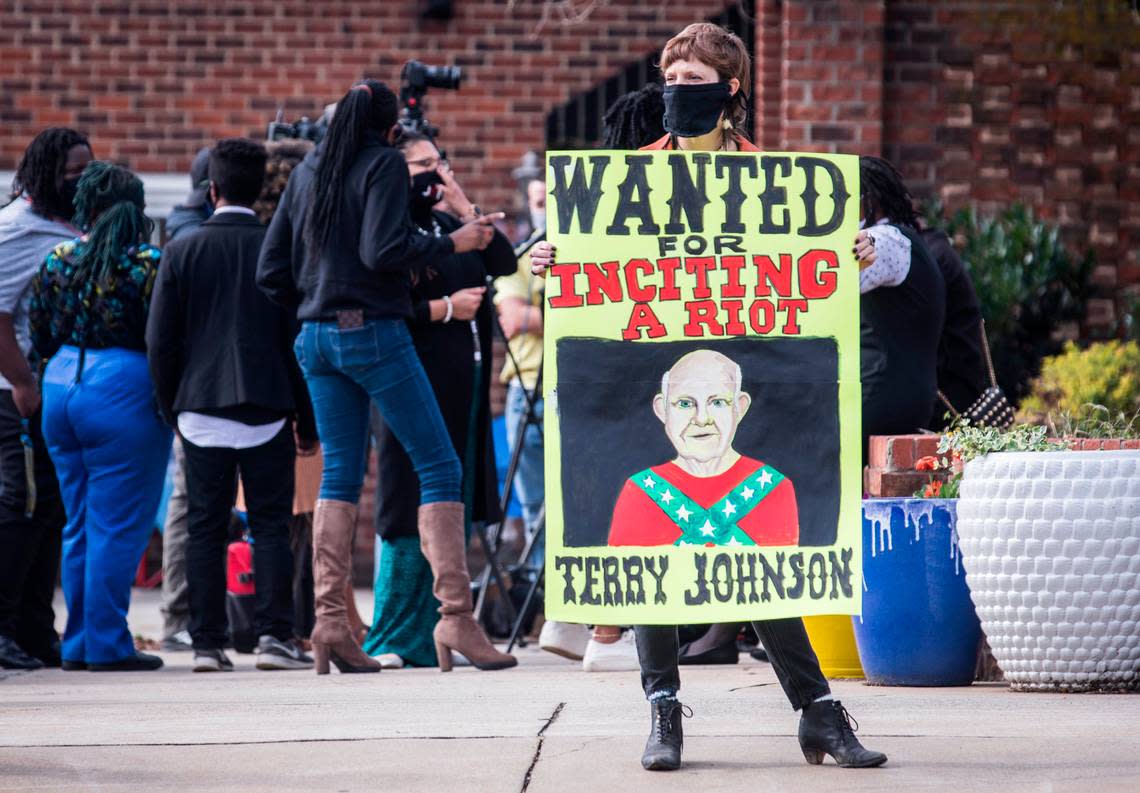NC town that was a BLM protest hot spot faces a new First Amendment lawsuit
The North Carolina town that made national headlines in 2020 when law enforcement officers used pepper fog to break up a march to the polls now faces new allegations of unconstitutionally hampering free speech.
A lawsuit filed Thursday in U.S. District Court centers on a protest in Graham the year before the town of 14,000, a bedroom community to Triangle and the Triad cities, became one of the most active Black Lives Matter protest sites in the country.
On Nov. 14, 2019, hundreds of demonstrators met at the Center for Spiritual Living near downtown intending to walk along the sidewalk to the Alamance County Detention Center. That’s where immigrants detained across North Carolina are often held prior to being moved to an Immigration and Customs Enforcement facility in Georgia.
The group, organized by Never Again Action, a Jewish-led coalition opposed to the detention and deportation of immigrants, planned to hold a traditional Jewish mourning service called a “shiva” in front of the jail.
Graham police, joined by officers from other agencies, repeatedly blocked off the sidewalk and street in front of the march and eventually surrounded the group, the lawsuit said.
Law enforcement officers’ aggressive approach included wearing riot gear, using a sound cannon to try to disperse the crowd and arresting several people, according to the lawsuit and journalists’ accounts.
Five of those arrested — Xavier Adams, Katelyn Campbell, Lisa Rowden, Ruby Sinreich and Mark Sfeir — are now suing, alleging violations of their First Amendment rights.
Alleged constitutional violations
The plaintiffs accuse Graham, current police Chief Kristy Cole, Alamance County Sheriff Terry Johnson and several Graham Police, Sheriff’s Office and Haw River Police Department employees of multiple constitutional violations.
The town’s rules restricting protests, the orders from law enforcement to disperse people that day and the subsequent arrests all were unlawful, they say. Additionally, they allege that police officer Clint Cross acted in a racially discriminatory way in choosing to arrest Adams, who identifies as Afro-Mexican, when his behavior was indistinguishable from others.
Adams was in a line of about 16 protesters who stood face-to-face with officers, singing and chanting, said the complaint in the lawsuit, filed in North Carolina’s Middle District.
He held out his hands to signal that he was not a threat, but Cross pointed at Adams, the only one in the line whose skin was not white, and said, “He needs to go,” according to the complaint.
County attorney Rik Stevens said staff received notice of the filing today, are reviewing it and had no immediate comment. Cross and the Graham Police did not immediately respond to requests for comment.
Johnson, who is up for his sixth reelection in November, told The Alamance News in a response to a recent candidate questionnaire that allegations of racial discrimination and excessive force by his deputies is a “false narrative.”
But partly due to the cost of litigation, the sheriff’s office is considering buying body cameras, Johnson said.
The protest ordinance
At the time of the protest, Graham had an extraordinarily strict ordinance governing public demonstrations.
It was adopted in 1967 as part of a wave of legislation across the South to tamp down on civil rights protests, particularly events involving children, The News & Observer and ProPublica previously reported.
The ordinance required any group of two or more people gathering “for the purpose of protesting any matter or making known any position or thought of the group or of attracting attention thereto” to get a permit from the police chief at least 24 hours in advance.
The chief had discretion to limit gatherings to six people and could deny permit applications if they might cause “a public disturbance.” Children couldn’t participate without the chief’s permission.
The new lawsuit argued that the ordinance was unconstitutional, as was officers’ reliance on the ordinance to declare the 2019 protest an unlawful assembly.
Never Again Action did not acquire a permit, the complaint said. “During the Protest, law enforcement officers gave multiple warnings through a PA system advising protestors that they were breaking the law because, they contended, it was unlawful to hold a march without permits from the city.”

It’s not the first time Graham’s protest ordinance has been challenged. In 2020, after local officers arrested several people who wanted to express their feelings about the police murder of George Floyd, civil rights groups joined together in a lawsuit challenging the protest rules.
A federal judge granted a temporary restraining order, finding that the ordinance was likely to be proven unconstitutional, and Graham responded by repealing it.
Graham has since put in place a new ordinance, which has come under criticism too.
Other law enforcement action at protests in Graham, including the pepper fog, has led to lawsuits. One case, centered on the sheriff’s involvement in an arrest at a July 2020 protest, is ongoing.
In the new lawsuit, the plaintiffs seek compensatory and punitive damages, along with attorneys’ fees. They are represented by Scott Holmes, associate professor of law at North Carolina Central University; Jaelyn Miller of K&L Gates; and Ian Mance of Emancipate NC.
